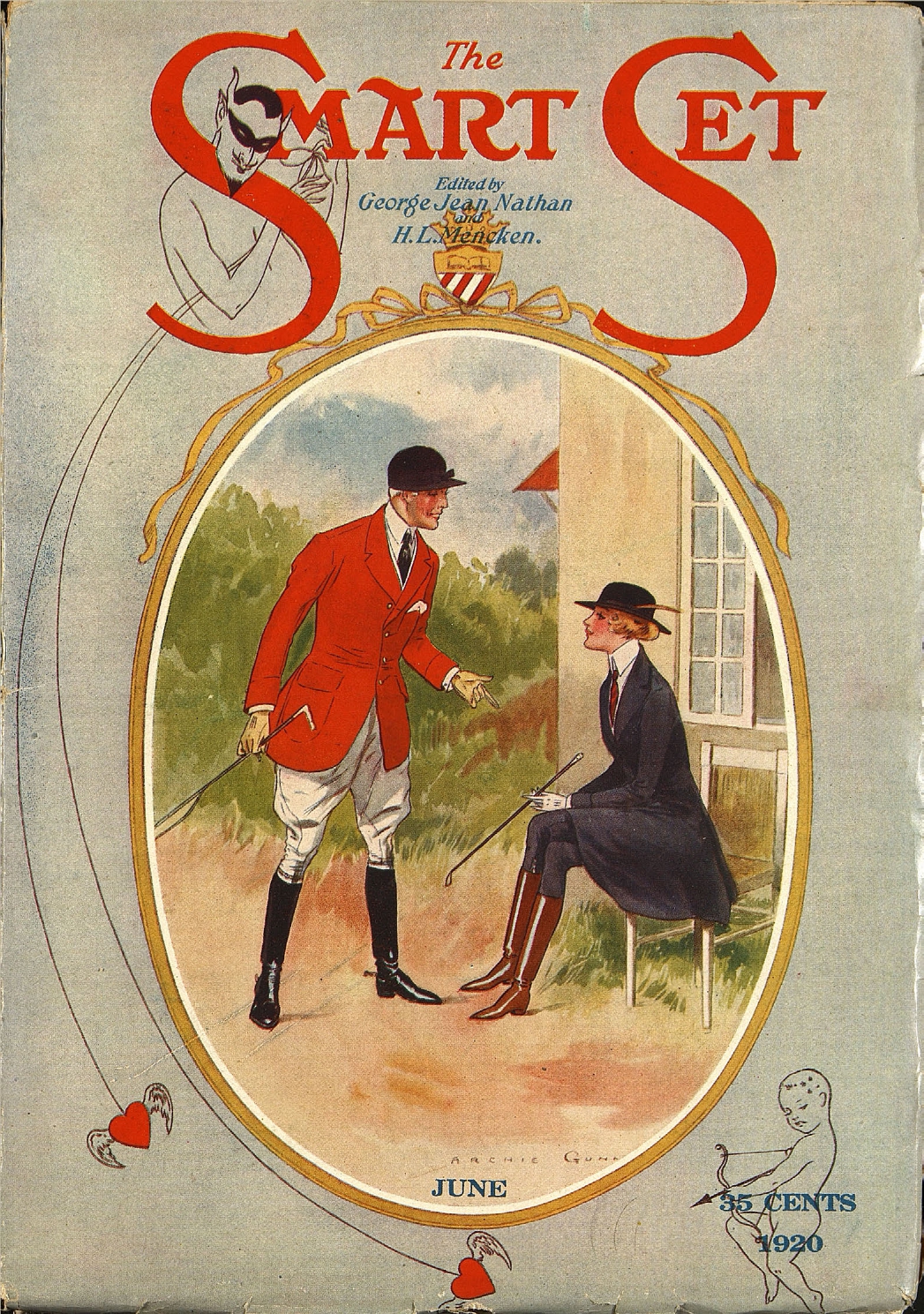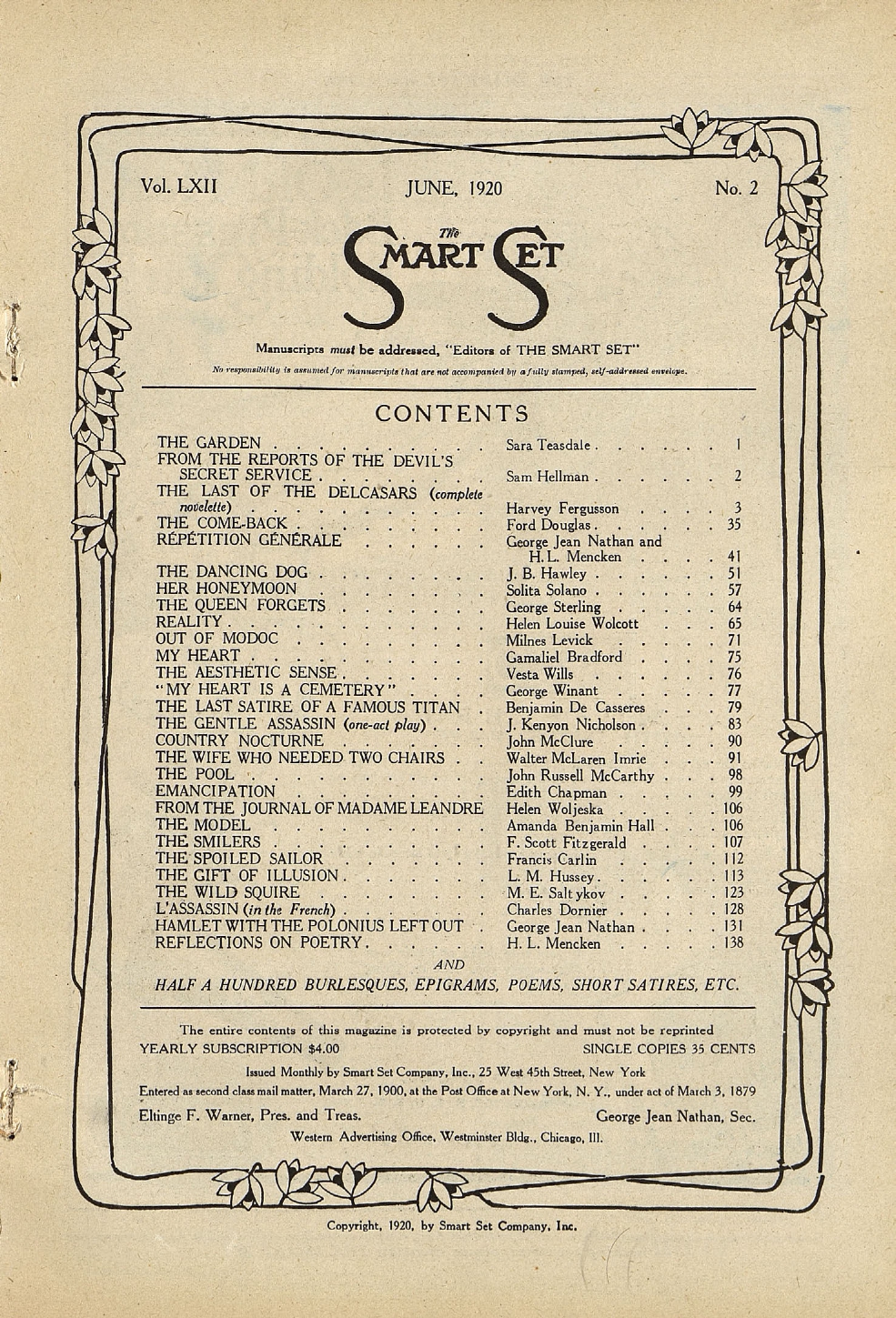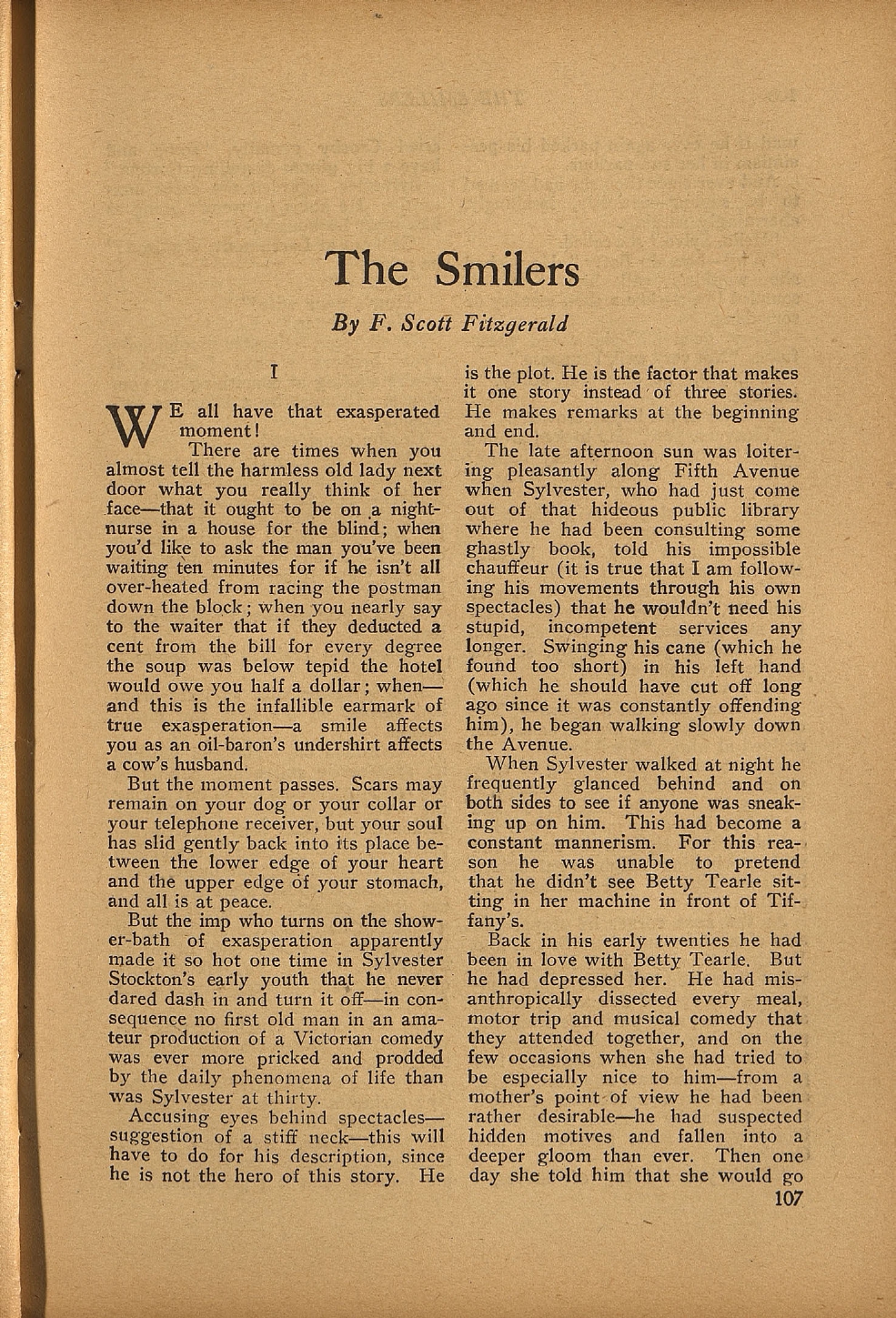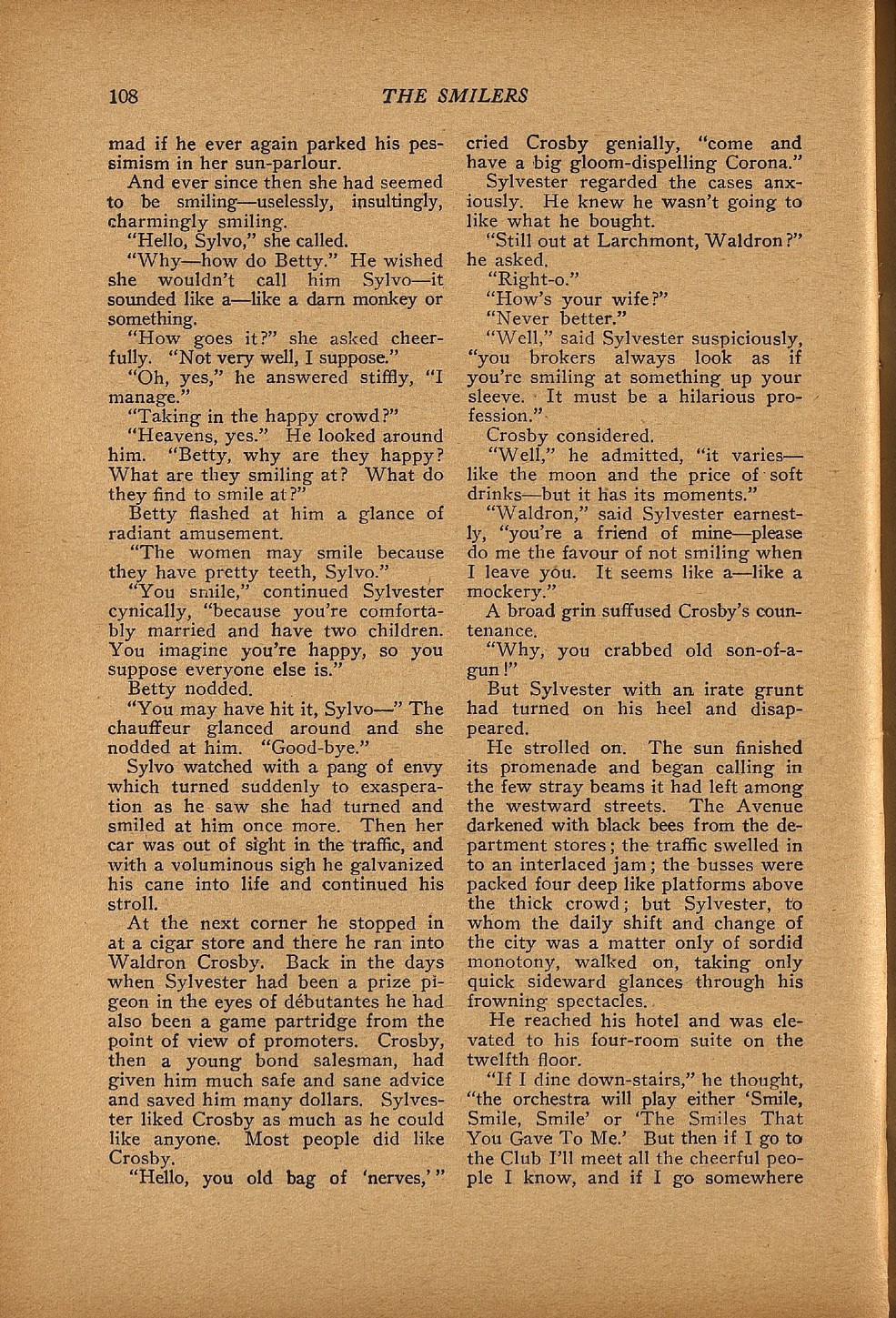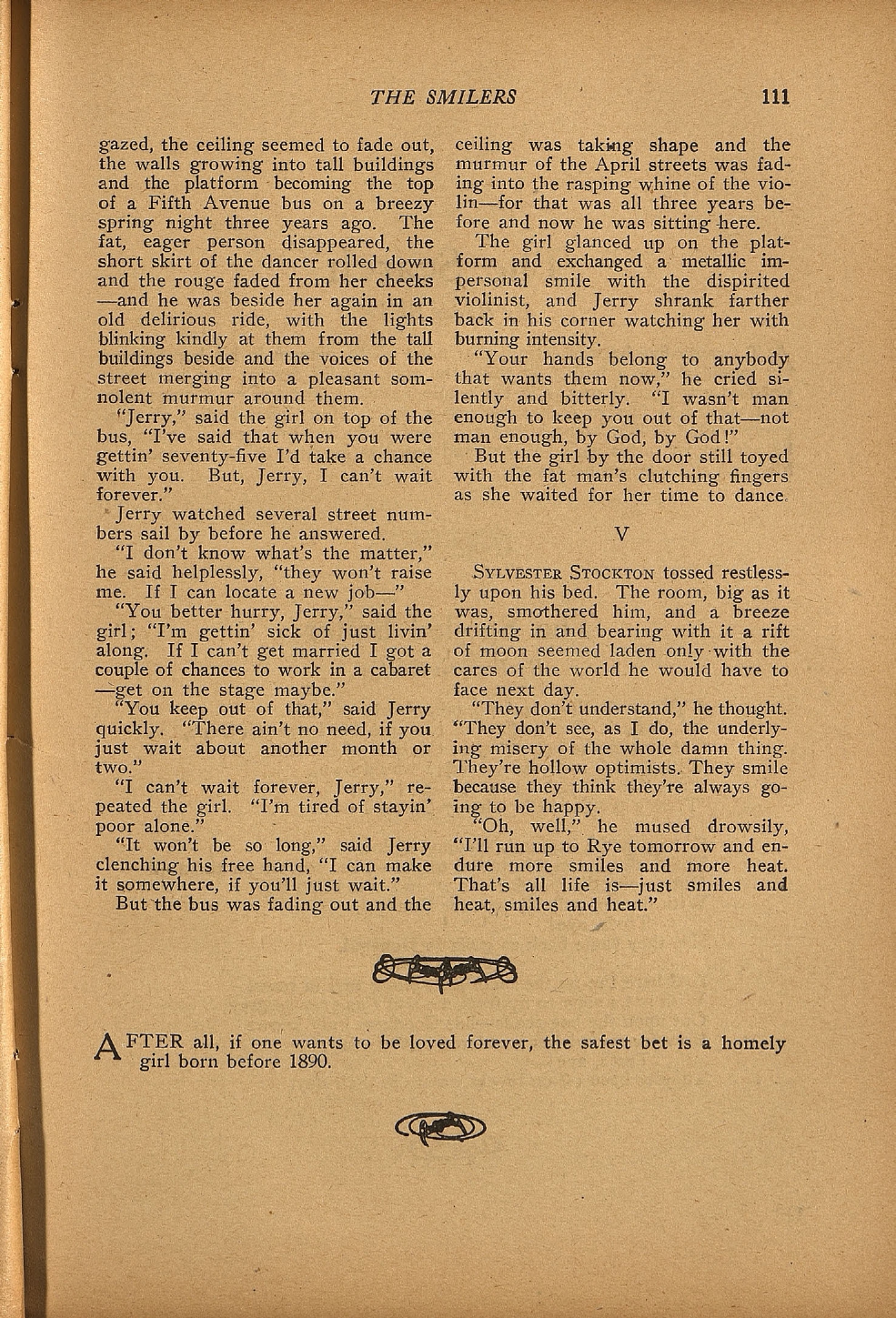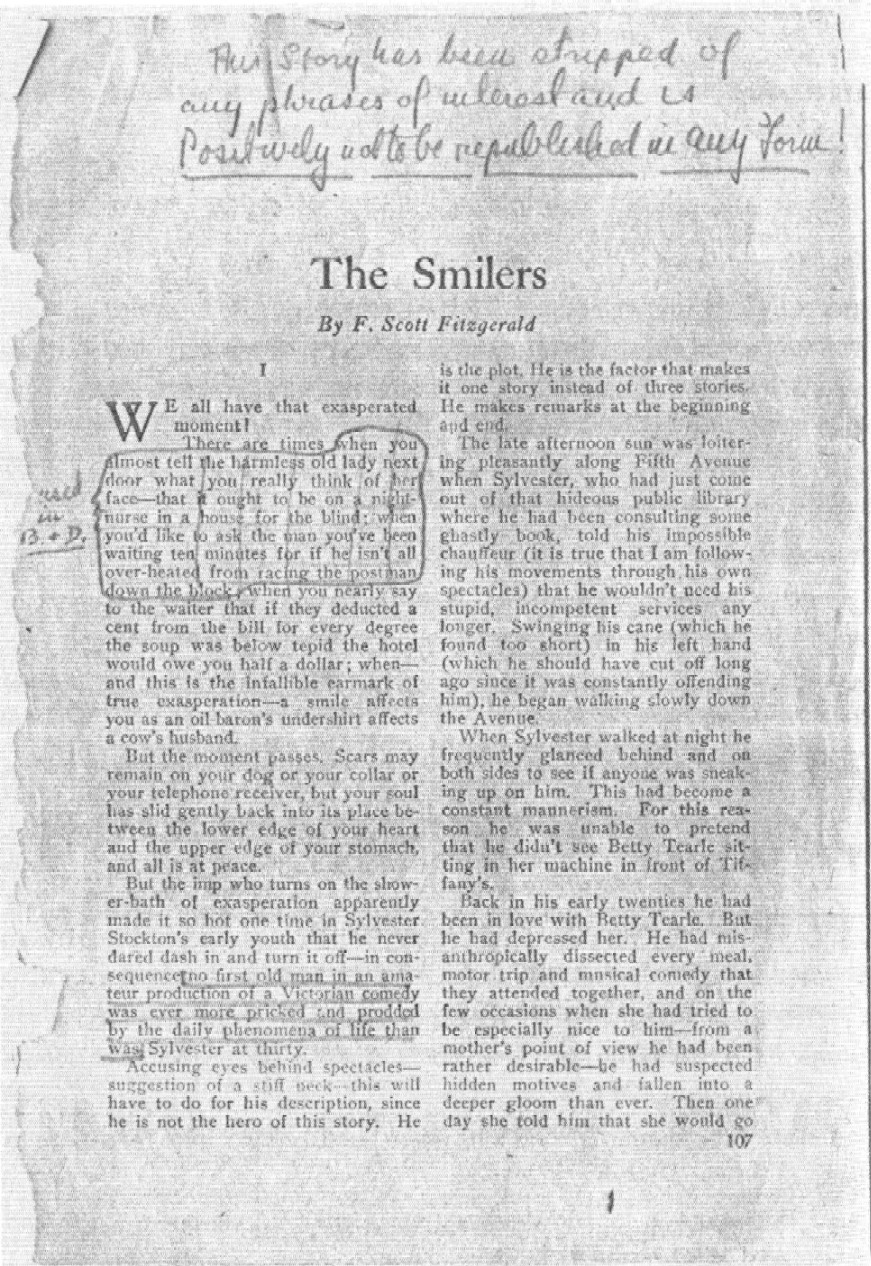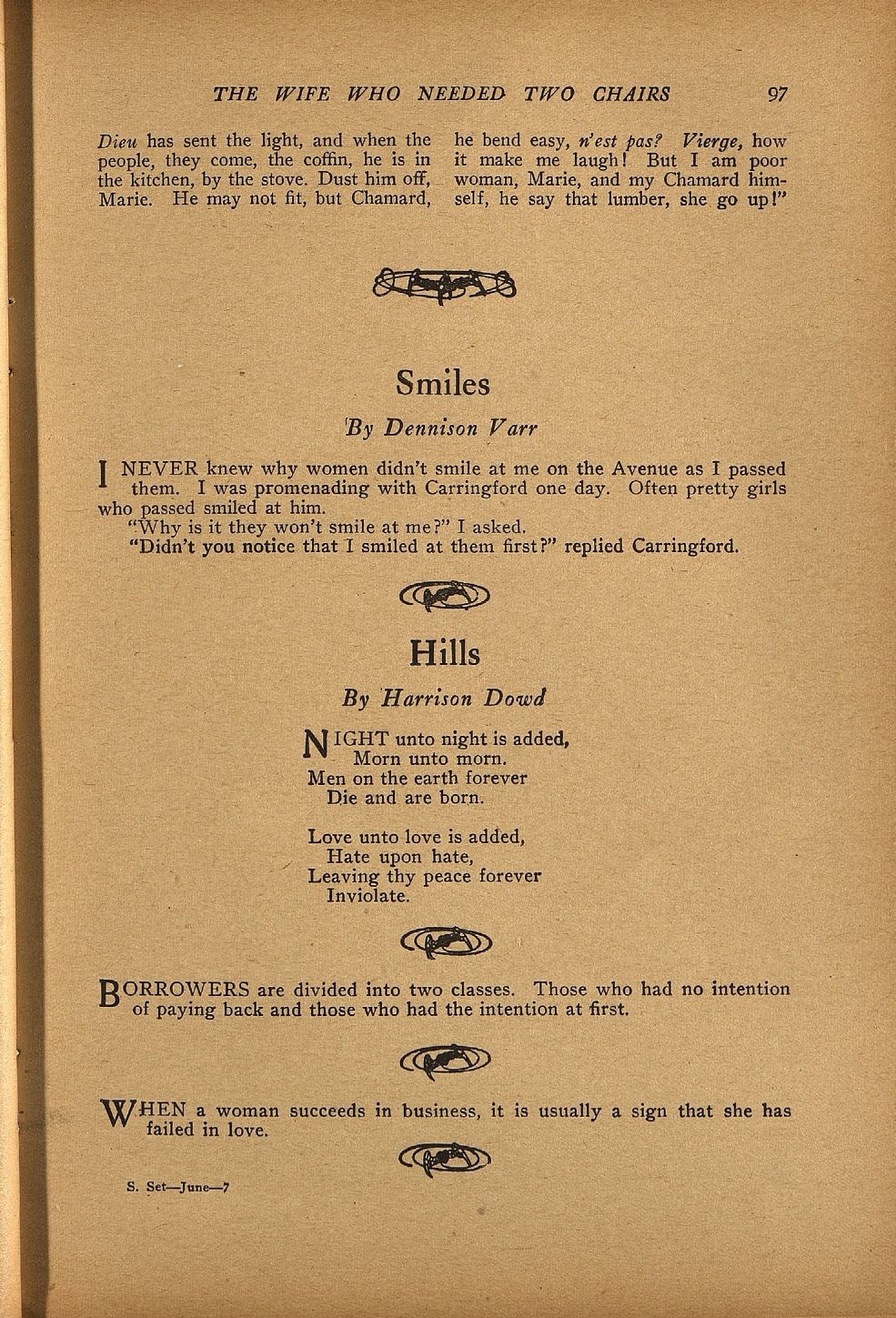
The Smilers
by F. Scott Fitzgerald
We all have that exasperated moment!
There are times when you almost tell the harmless old lady next door what you really think of her face—that it ought to be on a night-nurse in a house for the blind; when you’d like to ask the man you’ve been waiting ten minutes for if he isn’t all overheated from racing the postman down the block; when you nearly say to the waiter that if they deducted a cent from the bill for every degree the soup was below tepid the hotel would owe you half a dollar; when—and this is the infallible earmark of true exasperation—a smile affects you as an oil-baron’s undershirt affects a cow’s husband.
But the moment passes. Scars may remain on your dog or your collar or your telephone receiver, but your soul has slid gently back into its place between the lower edge of your heart and the upper edge of your stomach, and all is at peace.
But the imp who turns on the shower-bath of exasperation apparently made it so hot one time in Sylvester Stockton’s early youth that he never dared dash in and turn it off—in consequence no first old man in an amateur production of a Victorian comedy was ever more pricked and prodded by the daily phenomena of life than was Sylvester at thirty.
Accusing eyes behind spectacles—suggestion of a stiff neck—this will have to do for his description, since he is not the hero of this story. He is the plot. He is the factor that makes it one story instead of three stories. He makes remarks at the beginning and end.
The late afternoon sun was loitering pleasantly along Fifth Avenue when Sylvester, who had just come out of that hideous public library where he had been consulting some ghastly book, told his impossible chauffeur (it is true that I am following his movements through his own spectacles) that he wouldn’t need his stupid, incompetent services any longer. Swinging his cane (which he found too short) in his left hand (which he should have cut off long ago since it was constantly offending him), he began walking slowly down the Avenue.
When Sylvester walked at night he frequently glanced behind and on both sides to see if anyone was sneaking up on him. This had become a constant mannerism. For this reason he was unable to pretend that he didn’t see Betty Tearle sitting in her machine in front of Tiffany’s.
Back in his early twenties he had been in love with Betty Tearle. But he had depressed her. He had misanthropically dissected every meal, motor trip and musical comedy that they attended together, and on the few occasions when she had tried to be especially nice to him—from a mother’s point of view he had been rather desirable—he had suspected hidden motives and fallen into a deeper gloom than ever. Then one day she told him that she would go mad if he ever again parked his pessimism in her sun-parlour.
And ever since then she had seemed to be smiling—uselessly, insultingly, charmingly smiling.
“Hello, Sylvo,” she called.
“Why—how do, Betty.” He wished she wouldn’t call him Sylvo—it sounded like a—like a darn monkey or something.
“How goes it?” she asked cheerfully. “Not very well, I suppose.”
“Oh, yes,” he answered stiffly, “I manage.”
“Taking in the happy crowd?”
“Heavens, yes.” He looked around him. “Betty, why are they happy? What are they smiling at? What do they find to smile at?”
Betty flashed him a glance of radiant amusement.
“The women may smile because they have pretty teeth, Sylvo.”
“You smile,” continued Sylvester cynically, “because you’re comfortably married and have two children. You imagine you’re happy, so you suppose everyone else is.”
Betty nodded.
“You may have hit it, Sylvo——” The chauffeur glanced around and she nodded at him. “Good-bye.”
Sylvo watched with a pang of envy which turned suddenly to exasperation as he saw she had turned and smiled at him once more. Then her car was out of sight in the traffic, and with a voluminous sigh he galvanized his cane into life and continued his stroll.
At the next corner he stopped in at a cigar store and there he ran into Waldron Crosby. Back in the days when Sylvester had been a prize pigeon in the eyes of debutantes he had also been a game partridge from the point of view of promoters. Crosby, then a young bond salesman, had given him much safe and sane advice and saved him many dollars. Sylvester liked Crosby as much as he could like anyone. Most people did like Crosby.
“Hello, you old bag of nerves,” cried Crosby genially, “come and have a big gloom-dispelling Corona.”
Sylvester regarded the cases anxiously. He knew he wasn’t going to like what he bought.
“Still out at Larchmont, Waldron?” he asked.
“Right-o.”
“How’s your wife?”
“Never better.”
“Well,” said Sylvester suspiciously, “you brokers always look as if you’re smiling at something up your sleeve. It must be a hilarious profession.”
Crosby considered.
“Well,” he admitted, “it varies—like the moon and the price of soft drinks—but it has its moments.”
“Waldron,” said Sylvester earnestly, “you’re a friend of mine—please do me the favour of not smiling when I leave you. It seems like a—like a mockery.”
A broad grin suffused Crosby’s countenance.
“Why, you crabbed old son-of-a-gun!”
But Sylvester with an irate grunt had turned on his heel and disappeared.
He strolled on. The sun finished its promenade and began calling in the few stray beams it had left among the westward streets. The Avenue darkened with black bees from the department stores; the traffic swelled in to an interlaced jam; the buses were packed four deep like platforms above the thick crowd; but Sylvester, to whom the daily shift and change of the city was a matter only of sordid monotony, walked on, taking only quick sideward glances through his frowning spectacles.
He reached his hotel and was elevated to his four-room suite on the twelfth floor.
“If I dine downstairs,” he thought, “the orchestra will play either ‘Smile, Smile, Smile’ or ‘The Smiles That You Gave To Me’. But then if I go to the Club I’ll meet all the cheerful people I know, and if I go somewhere else where there’s no music, I won’t get anything fit to eat.”
He decided to have dinner in his rooms.
An hour later, after disparaging some broth, a squab and a salad, he tossed fifty cents to the room-waiter, and then held up his hand warningly.
“Just oblige me by not smiling when you say ‘thanks’?”
He was too late. The waiter had grinned.
“Now, will you please tell me,” asked Sylvester peevishly, “what on earth you have to smile about?”
The waiter considered. Not being a reader of the magazines he was not sure what was characteristic of waiters, yet he supposed something characteristic was expected of him.
“Well, mister,” he answered, glancing at the ceiling with all the ingenuousness he could muster in his narrow, sallow countenance, “it’s just something my face does when it sees four bits comin’.”
Sylvester waved him away.
“Waiters are happy because they’ve never had anything better,” he thought. “They haven’t enough imagination to want anything.”
At nine o’clock from sheer boredom he sought his expressionless bed.
II
As Sylvester left the cigar store, Waldron Crosby followed him out, and turning off Fifth Avenue down a cross street entered a brokerage office. A plump man with nervous hands rose and hailed him.
“Hello, Waldron.”
“Hello, Potter—I just dropped in to hear the worst.”
The plump man frowned.
“We’ve just got the news,” he said.
“Well, what is it? Another drop?”
“Closed at seventy-eight. Sorry, old boy.”
“Whew!”
“Hit pretty hard?”
“Cleaned out!”
The plump man shook his head, indicating that life was too much for him, and turned away.
Crosby sat there for a moment without moving. Then he rose, walked into Potter’s private office and picked up the phone.
“Gi’me Larchmont 838.”
In a moment he had his connection.
“Mrs. Crosby there?”
A man’s voice answered him.
“Yes; this you, Crosby? This is Doctor Shipman.”
“Dr. Shipman?” Crosby’s voice showed sudden anxiety.
“Yes—I’ve been trying to reach you all afternoon. The situation’s changed and we expect the child tonight.”
“Tonight?”
“Yes. Everything’s OK. But you’d better come right out.”
“I will. Good-bye.”
He hung up the receiver and started out the door, but paused as an idea struck him. He returned, and this time called a Manhattan number.
“Hello, Donny, this is Crosby.”
“Hello, there, old boy. You just caught me; I was going——”
“Say, Donny, I want a job right away, quick.”
“For whom?”
“For me.”
“Why, what’s the——”
“Never mind. Tell you later. Got one for me?”
“Why, Waldron, there’s not a blessed thing here except a clerkship. Perhaps next——”
“What salary goes with the clerkship?”
“Forty—say forty-five a week.”
“I’ve got you. I start tomorrow.”
“All right. But say, old man——”
“Sorry, Donny, but I’ve got to run.”
Crosby hurried from the brokerage office with a wave and a smile at Potter. In the street he took out a handful of small change and after surveying it critically hailed a taxi.
“Grand Central—quick!” he told the driver.
III
At six o’clock Betty Tearle signed the letter, put it into an envelope and wrote her husband’s name upon it. She went into his room and after a moment’s hesitation set a black cushion on the bed and laid the white letter on it so that it could not fail to attract his attention when he came in. Then with a quick glance around the room she walked into the hall and upstairs to the nursery.
“Clare,” she called softly.
“Oh, Mummy!” Clare left her doll’s house and scurried to her mother.
“Where’s Billy, Clare?”
Billy appeared eagerly from under the bed.
“Got anything for me?” he inquired politely.
His mother’s laugh ended in a little catch and she caught both her children to her and kissed them passionately. She found that she was crying quietly and their flushed little faces seemed cool against the sudden fever racing though her blood.
“Take care of Clare—always—Billy darling——”
Billy was puzzled and rather awed.
“You’re crying,” he accused gravely.
“I know—I know I am——”
Clare gave a few tentative sniffles, hesitated, and then clung to her mother in a storm of weeping.
“I d-don’t feel good, Mummy—I don’t feel good.”
Betty soothed her quietly.
“We won’t cry any more, Clare dear—either of us.”
But as she rose to leave the room her glance at Billy bore a mute appeal, too vain, she knew, to be registered on his childish consciousness.
Half an hour later as she carried her travelling bag to a taxicab at the door she raised her hand to her face in mute admission that a veil served no longer to hide her from the world.
“But I’ve chosen,” she thought dully.
As the car turned the corner she wept again, resisting a temptation to give up and go back.
“Oh, my God!?” she whispered. “What am I doing? What have I done? What have I done?”
IV
When Jerry, the sallow, narrow-faced waiter, left Sylvester’s rooms he reported to the head-waiter, and then checked out for the day.
He took the subway south and alighting at William Street walked a few blocks and entered a billiard parlour.
An hour later he emerged with a cigarette drooping from his bloodless lips, and stood on the sidewalk as if hesitating before making a decision. He set off eastward.
As he reached a certain corner his gait suddenly increased and then quite as suddenly slackened. He seemed to want to pass by, yet some magnetic attraction was apparently exerted on him, for with a sudden face-about he turned in at the door of a cheap restaurant—half cabaret, half chop-suey parlour—where a miscellaneous assortment gathered nightly.
Jerry found his way to a table situated in the darkest and most obscure corner. Seating himself with a contempt for his surroundings that betokened familiarity rather than superiority he ordered a glass of claret.
The evening had begun. A fat woman at the piano was expelling the last jauntiness from a hackneyed foxtrot, and a lean, dispirited male was assisting her with lean, dispirited notes from a violin. The attention of the patrons was directed at a dancer wearing soiled stockings and done largely in peroxide and rouge who was about to step upon a small platform, meanwhile exchanging pleasantries with a fat, eager person at the table beside her who was trying to capture her hand.
Over in the corner Jerry watched the two by the platform and, as he gazed, the ceiling seemed to fade out, the walls growing into tall buildings and the platform becoming the top of a Fifth Avenue bus on a breezy spring night three years ago. The fat, eager person disappeared, the short skirt of the dancer rolled down and the rouge faded from her cheeks—and he was beside her again in an old delirious ride, with the lights blinking kindly at them from the tall buildings beside and the voices of the street merging into a pleasant somnolent murmur around them.
“Jerry,” said the girl on top of the bus, “I’ve said that when you were gettin’ seventy-five I’d take a chance with you. But, Jerry, I can’t wait for ever.”
Jerry watched several street numbers sail by before he answered.
“I don’t know what’s the matter,” he said helplessly, “they won’t raise me. If I can locate a new job——”
“You better hurry, Jerry,” said the girl; “I’m gettin’ sick of just livin’ along. If I can’t get married I got a couple of chances to work in a cabaret—get on the stage maybe.”
“You keep out of that,” said Jerry quickly. “There ain’t no need, if you just wait about another month or two.”
“I can’t wait for ever, Jerry,” repeated the girl. “I’m tired of stayin’ poor alone.”
“It won’t be so long,” said Jerry clenching his free hand, “I can make it somewhere, if you’ll just wait.”
But the bus was fading out and the ceiling was taking shape and the murmur of the April streets was fading into the rasping whine of the violin—for that was all three years before and now he was sitting here.
The girl glanced up on the platform and exchanged a metallic impersonal smile with the dispirited violinist, and Jerry shrank farther back in his corner watching her with burning intensity.
“Your hands belong to anybody that wants them now,” he cried silently and bitterly. “I wasn’t man enough to keep you out of that—not man enough, by God, by God!”
But the girl by the door still toyed with the fat man’s clutching fingers as she waited for her time to dance.
V
Sylvester Stockton tossed restlessly upon his bed. The room, big as it was, smothered him, and a breeze drifting in and bearing with it a rift of moon seemed laden only with the cares of the world he would have to face next day.
“They don’t understand,” he thought. “They don’t see, as I do, the underlying misery of the whole damn thing. They’re hollow optimists. They smile because they think they’re always going to be happy.”
“Oh, well,” he mused drowsily, “I’ll run up to Rye tomorrow and endure more smiles and more heat. That’s all life is—just smiles and heat, smiles and heat.”
Notes
The story was written in St Paul in September 1919 as “A Smile for Sylvo”. After failing at his attempt to make a fast success as an advertising writer in New York, Fitzgerald returned to St Paul to rewrite his first novel. This Side of Paradise was accepted by Scribners in September, and Fitzgerald devoted the rest of the year to writing short stories for ready money. He submitted “The Smilers” to Scribner’s Magazine, which rejected it. After Harold Ober, his literary agent, was unable to place the story in one of the magazines that paid well, Fitzgerald sold it to the Smart Set for $35: “I want to keep in right with Menken+Nathan as they’re the most powerful critics in the country.” Although the Smart Set under editors H. L. Mencken and George Jean Nathan was an influential magazine among literary people, its limited circulation did not allow for generous payment. Fitzgerald sold stories to the Smart Set when they were unplaceable in the mass-circulation magazines—including two of his masterpieces, “The Diamond as Big as the Ritz” and “May Day”.
Although “The Smilers” was written soon after acceptance of This Side of Paradise, it is still very much a college literary magazine piece—self-conscious and blatantly ironic. This story shows the didactic streak that marked several of Fitzgerald’s early stories, such as “The Four Fists” and “The Cut-Glass Bowl”. The moralizing quality in his work—especially the stories—has been obscured by Fitzgerald’s image as the Boswell of the Jazz Age. Near the end of his life he noted that he sometimes wishes he had gone into musical comedy, “but I guess I am too much a moralist at heart and really want to preach at people in some acceptable form rather than to entertain them.”
Published in The Smart Set magazine (June 1920).
Not illustrated.
Page one with F. Scott Fitzgerald's notes ("tearsheets").
Page 97 of the same magazine issue with Smiles, by Dennison Varr.
